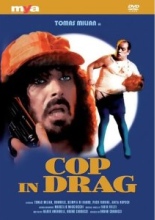
 Been to The Blue Gay? You know, “that weird club,” where the drag queens put on big production numbers, like a skeleton act performed in total darkness, a breakdancing extravaganza … and also murder! When a transvestite named Nadia is found dead in his/her dressing room, Inspector Giraldi (Tomas Milian) is assigned to the case, because, as his supervisor says, “Sissies like your type!”
Been to The Blue Gay? You know, “that weird club,” where the drag queens put on big production numbers, like a skeleton act performed in total darkness, a breakdancing extravaganza … and also murder! When a transvestite named Nadia is found dead in his/her dressing room, Inspector Giraldi (Tomas Milian) is assigned to the case, because, as his supervisor says, “Sissies like your type!”
Welcome to Cop in Drag, an Italian crime comedy so broad, you could study its cartography. With the prime suspect being The Blue Gay’s prima donna, the cocaine-eyed Giraldi goes undercover in the club. Rather than don drag himself, he forces that indignity on his rotund sidekick, Venticello (uni-monikered Bombolo), the subject of many a slap.
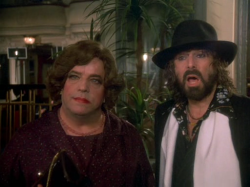 About the height of the humor is Venticello being forced to eat cat food. (Hey, just because it’s the height doesn’t mean it’s funny.) As you’d expect, the majority of jokes fall into the category of “potential to offend,” with “fairy,” “fruit,” “fag” and other derogatory terms that don’t start with F batted about
About the height of the humor is Venticello being forced to eat cat food. (Hey, just because it’s the height doesn’t mean it’s funny.) As you’d expect, the majority of jokes fall into the category of “potential to offend,” with “fairy,” “fruit,” “fag” and other derogatory terms that don’t start with F batted about
by the people for whom we’re supposed to root. A subplot has Mrs. Giraldi mistaking her husband for a homosexual, and you kinda wish the bickering spouses would go back to shaking their newborn baby.
Apparently, the Giraldi series was a big hit among Italians, with the franchise numbering 11 entries. While Cop in Drag certainly is watchable and capable of generating a few smiles (mostly at its own expense), Bruno Corbucci’s effort made me long for the comparative smarts and subtlety of his brother Sergio’s Super Fuzz. Italy’s Tootsie, this ain’t. —Rod Lott

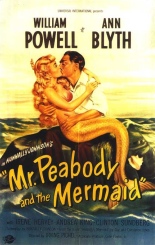
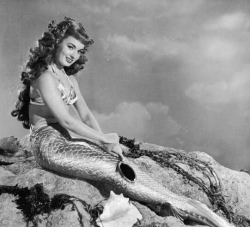 When he accidentally snags a mermaid (Ann Blyth) while fishing, he kidnaps her and takes her back to live in his lavishly deep fish pond right under his wife’s nose. Polly suspects something’s up, but she thinks he’s having an affair with a local hussy. Not that Polly has a lot of moral ground to stand on, since she’s been having secret lunches with the village cad.
When he accidentally snags a mermaid (Ann Blyth) while fishing, he kidnaps her and takes her back to live in his lavishly deep fish pond right under his wife’s nose. Polly suspects something’s up, but she thinks he’s having an affair with a local hussy. Not that Polly has a lot of moral ground to stand on, since she’s been having secret lunches with the village cad.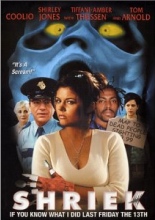
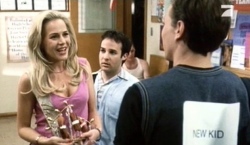 Tiffani-Amber Thiessen, looking pudgy and threatening to squeak out of her strapless blouses, has the Courtney Cox role as a sexpot reporter to Tom Arnold’s doofus of a security guard. It’s pretty sad when someone like Arnold makes the rest of the cast look like amateurs — including a pre-
Tiffani-Amber Thiessen, looking pudgy and threatening to squeak out of her strapless blouses, has the Courtney Cox role as a sexpot reporter to Tom Arnold’s doofus of a security guard. It’s pretty sad when someone like Arnold makes the rest of the cast look like amateurs — including a pre-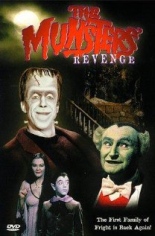
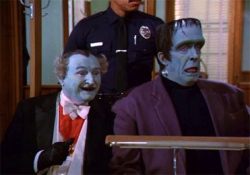 After the city is terrorized, Herman (Fred Gwynne) and Grandpa (Al Lewis) are wrongly accused and thrown in jail. Their cellmate (
After the city is terrorized, Herman (Fred Gwynne) and Grandpa (Al Lewis) are wrongly accused and thrown in jail. Their cellmate (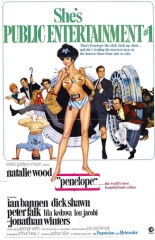
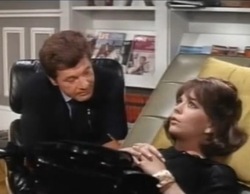 Directed by
Directed by